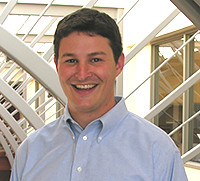While schools and governments were putting the top priority on teaching basic reading skills to beginners, older students have been faltering on the path to understanding what they’re reading. Two-thirds of eighth- and twelfth-graders read below proficiency, and one-third of high school graduates are not prepared to read at the college level, according to research.
As educator concerns alight on this emerging challenge, a team led by Michael Faggella-Luby at the Center for Behavioral Education and Research in the Neag School of Education has compiled a review of recent research on adolescent literacy. Faggella-Luby’s peer review article, written with doctoral students Sharon Ware and Ashley Capozzoli, has just been published in the Journal of Literacy Research, one of the field’s premier journals.
Faggella-Luby says, as he reviewed education policies, he found recommendations for practitioners that were not tied to research. The peer review article seeks to bridge that gap. “A principal and a teacher don’t need to read the research,” he says, “but they need to know when a recommendation is made they can trust that there’s the very best cutting edge research behind it.”

The report’s conclusion issues a “collective call to action.” Faggella-Luby’s team writes, “Student performance will not improve if we continue to work in disconnected silos of single-interest objectives.”
The findings come at the most opportune time, as a new federal administration and secretary of education focus on secondary education and the reauthorization of No Child Left Behind.
“They tend to look for summary papers, and Michael’s paper is a great source of what’s available,” says George Sugai, the Carole J. Neag Chair in Special Education and a behavioral expert in Neag’s Educational Psychology Department.
Sugai adds that state policymakers are focusing their attention on the high school dropout rate. “The literacy issue runs right through the middle of that,” he says.
And, indeed, the article outlines the literacy crisis, not only as a matter of secondary school graduation but as a chasm for students to cross into higher education, the workplace and citizenship in a democratic society.
Timing is urgent to act on behalf of students beyond the third grade, Faggella-Luby says. “We don’t know everything about improving adolescent literacy, but we know enough to get started now. … Reading’s going to change for them over time, and we need to recognize that and how we’re going to do it.”
The report is followed by responses from three external experts – a researcher, a practitioner and a federal policymaker – and concludes with a group of pressing questions about the literacy problem.
A strong theme in the article suggests a need for content-specific teachers to incorporate formalized literacy training for struggling readers, despite time constraints in the classroom. The article calls the idea “the product of rethinking what and how all content-area teachers teach, not solely the purview of the English Department, but rather a shared responsibility among secondary educators.”
“You can’t isolate them out of the content,” Sugai says of at-risk readers. And it’s not too late to intervene for them, according to research cited in the article.
Sugai and Faggella-Luby agree that their own realm of research and teacher training is a fertile ground for addressing the challenge.
New teachers need to be armed not only with the tools to improve adolescent literacy, Sugai says, but also with the background “to say in their high schools, ‘We’re not doing it, we should be doing it.’ They’ve got to be leaders.”
Faggella-Luby was first published as part of his doctoral work at the University of Kansas and is pleased to include Ware and Capozzoli as two first-time academic publishers in this peer review journal article.
As an offshoot of their work, Faggella-Luby says the team is trying to boil down the information to 20 recommendations for reaching academic literacy to publish in a teacher-friendly journal called Teaching Exceptional Children. The results of the review were also presented at conferences in Kansas and New Mexico.
Faggella-Luby, M. N., Ware, S. M. & Capozzoli, A. (2009). Adolescent Literacy—Reviewing Adolescent Literacy Reports: Key Components and Critical Questions. Journal of Literacy Research, 41(4), 453-475. doi:10.1080/10862960903340199This article is available only if your library pays for access rights to the journal. Please contact the author if you have any questions.
 Facebook
Facebook
 Twitter
Twitter
 LinkedIn
LinkedIn
